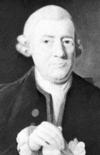- Baskerville, John
-
born Jan. 28, 1706, Wolverly, Worcestershire, Eng.died Jan. 8, 1775, Birmingham, WarwickshireBritish typographer.In 1757 he set up a printing house and published his first work, an edition of Virgil. His editions of the Latin classics, John Milton's poems (1758), and a folio Bible (1763) are characterized by clear and careful presswork rather than ornament; they are among the finest examples of the art of printing. He served as printer to Cambridge University (1758–68), and he created the widely used Baskerville typeface, which is still used and prized for its clarity and balance.
 Baskerville, detail of a portrait after James Millar, 1774; in the National Portrait Gallery, LondonBy courtesy of the National Portrait Gallery, London
Baskerville, detail of a portrait after James Millar, 1774; in the National Portrait Gallery, LondonBy courtesy of the National Portrait Gallery, London* * *
▪ English printerborn Jan. 28, 1706, Wolverly, Worcestershire, Eng.died Jan. 8, 1775, Birmingham, WarwickshireEnglish printer and creator of a typeface of great distinction bearing his name, whose works are among the finest examples of the art of printing.Baskerville became a writing master at Birmingham but in 1740 established a japanning (varnishing) business, whose profits enabled him to experiment in typefounding. He set up a printing house and in 1757 published his first work, an edition of Virgil, followed in 1758 by an edition of John Milton. Appointed printer to the University of Cambridge, he undertook an edition of the Bible (1763), which is considered his masterpiece. He published a particularly beautiful edition of Horace in 1762; the success of a second edition (1770) encouraged him to issue a series of editions of Latin authors.The bold quality of Baskerville's print derived from his use of a highly glossed paper and a truly black ink that he had invented. His typography was much criticized in England, and after his death his types were purchased by the French dramatist Pierre-Augustin Caron de Beaumarchais. Their subsequent history is uncertain, but in 1917 the surviving punches and matrices were recognized, and in 1953 they were presented to the University of Cambridge. Baskerville type has been revived, its clarity and balance making it a good type for continuous reading.* * *
Universalium. 2010.
